 Web Front-end
Web Front-end
 JS Tutorial
JS Tutorial
 Discuss the issue of cross-domain access to one or more domain names in react axios
Discuss the issue of cross-domain access to one or more domain names in react axios
Discuss the issue of cross-domain access to one or more domain names in react axios
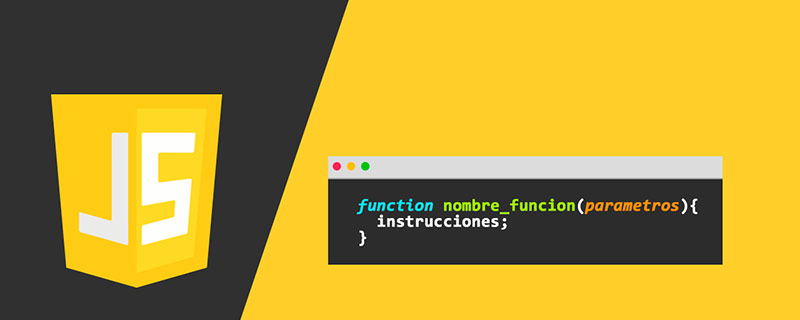
[Related article recommendations: ajax video tutorial]
1.react axios cross-domain access to a domain name
The configuration is very simple, you only need to configure it in the current package.json file:
"proxy":"http://iot-demo-web- dev.autel.com", //Of course, here is a fake address
like this:
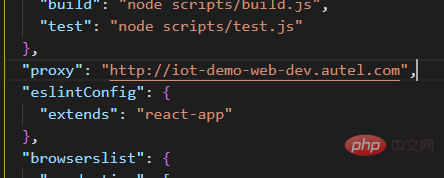
The cross-domain is completed, Of course, you can also add a few more pieces of code like on the Internet, like this:

I don’t know what will happen if you write this code. Anyway, I will report an error. I can't show you the specific error message here because my project has already been run npm run eject This command
The error message probably means that proxy hopes to get a string, but now What I get is an object, so I can only use the method of the first picture for cross-domain
Then we install axios. Of course, other things are also possible. Create an api file in the src directory project, and then Create a user.js in the api file and write the following code
import axios from 'axios'
export function _user(data) {
return axios.get('device/detail', data)
}The cross-domain I use here is the kind of cross-domain shown in the first picture
When you need to send a request Write the following code in the place:
import { _user } from '../api/user'
componentDidMount() {
let res = _user({})
console.log(res)
}Then we can happily obtain the data given to us by the background
The above kind of cross-domain can be said to be very convenient, but , what if the backend gives us two or even three different domain names? Then we have to use plug-ins
2.react axios to access multiple domain names across domains
Install the plug-in: npm install --save http-proxy-middleware
After installation, we start the configuration:
1. First, temporarily run the command to expose the configuration
npm run eject or yarn eject
Here you may encounter an error:

At this time, you can Baidu the error report, Or follow me and continue.
The reason for the error is because when we use scaffolding to build react, the system will automatically add a .gitignore file to us. If you have not submitted it to the warehouse, you need to submit it first. Warehouse
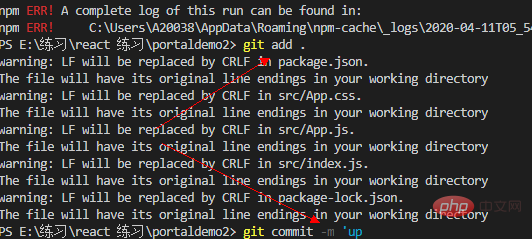
After completing these two steps, you can continue to name npm run eject . After the configuration file is exposed, your package.json There may be many configurations, let’s not worry about it. Create a setupProxy.js under src and write the following code in it:
const { createProxyMiddleware } = require('http-proxy-middleware')
module.exports = function (app) {
app.use(
createProxyMiddleware('/api', {
target: 'http://iot-demo-web-server-dev.autel.com',
changeOrigin: true,
})
)
app.use(
'/sys',
createProxyMiddleware({
target: 'http://localhost:5001',
changeOrigin: true,
})
);
}Find the scripts path and open strat.js
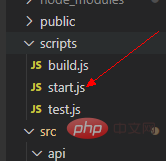
Negotiate the following code around line 117:
require('../src/setupProxy')(devServer) //注意路径是否正,是你刚才建的那个文件
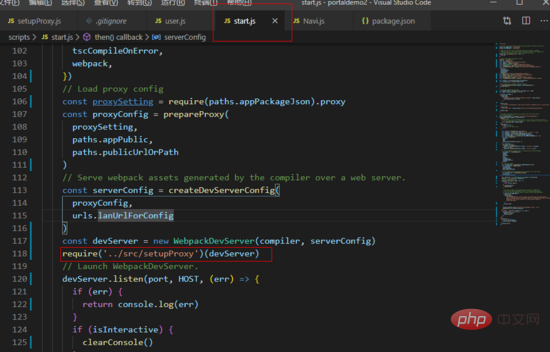
So many cross-domains will be successful. It is worth noting that you need to Add api or sys in front of the specific path like this

Related learning recommendations: js video tutorial
The above is the detailed content of Discuss the issue of cross-domain access to one or more domain names in react axios. For more information, please follow other related articles on the PHP Chinese website!

Hot AI Tools

Undresser.AI Undress
AI-powered app for creating realistic nude photos

AI Clothes Remover
Online AI tool for removing clothes from photos.

Undress AI Tool
Undress images for free

Clothoff.io
AI clothes remover

Video Face Swap
Swap faces in any video effortlessly with our completely free AI face swap tool!

Hot Article

Hot Tools

Notepad++7.3.1
Easy-to-use and free code editor

SublimeText3 Chinese version
Chinese version, very easy to use

Zend Studio 13.0.1
Powerful PHP integrated development environment

Dreamweaver CS6
Visual web development tools

SublimeText3 Mac version
God-level code editing software (SublimeText3)

Hot Topics
 1386
1386
 52
52
 How to build a real-time chat app with React and WebSocket
Sep 26, 2023 pm 07:46 PM
How to build a real-time chat app with React and WebSocket
Sep 26, 2023 pm 07:46 PM
How to build a real-time chat application using React and WebSocket Introduction: With the rapid development of the Internet, real-time communication has attracted more and more attention. Live chat apps have become an integral part of modern social and work life. This article will introduce how to build a simple real-time chat application using React and WebSocket, and provide specific code examples. 1. Technical preparation Before starting to build a real-time chat application, we need to prepare the following technologies and tools: React: one for building
 Guide to React front-end and back-end separation: How to achieve decoupling and independent deployment of front-end and back-end
Sep 28, 2023 am 10:48 AM
Guide to React front-end and back-end separation: How to achieve decoupling and independent deployment of front-end and back-end
Sep 28, 2023 am 10:48 AM
React front-end and back-end separation guide: How to achieve front-end and back-end decoupling and independent deployment, specific code examples are required In today's web development environment, front-end and back-end separation has become a trend. By separating front-end and back-end code, development work can be made more flexible, efficient, and facilitate team collaboration. This article will introduce how to use React to achieve front-end and back-end separation, thereby achieving the goals of decoupling and independent deployment. First, we need to understand what front-end and back-end separation is. In the traditional web development model, the front-end and back-end are coupled
 How to build simple and easy-to-use web applications with React and Flask
Sep 27, 2023 am 11:09 AM
How to build simple and easy-to-use web applications with React and Flask
Sep 27, 2023 am 11:09 AM
How to use React and Flask to build simple and easy-to-use web applications Introduction: With the development of the Internet, the needs of web applications are becoming more and more diverse and complex. In order to meet user requirements for ease of use and performance, it is becoming increasingly important to use modern technology stacks to build network applications. React and Flask are two very popular frameworks for front-end and back-end development, and they work well together to build simple and easy-to-use web applications. This article will detail how to leverage React and Flask
 How to build a reliable messaging app with React and RabbitMQ
Sep 28, 2023 pm 08:24 PM
How to build a reliable messaging app with React and RabbitMQ
Sep 28, 2023 pm 08:24 PM
How to build a reliable messaging application with React and RabbitMQ Introduction: Modern applications need to support reliable messaging to achieve features such as real-time updates and data synchronization. React is a popular JavaScript library for building user interfaces, while RabbitMQ is a reliable messaging middleware. This article will introduce how to combine React and RabbitMQ to build a reliable messaging application, and provide specific code examples. RabbitMQ overview:
 React code debugging guide: How to quickly locate and solve front-end bugs
Sep 26, 2023 pm 02:25 PM
React code debugging guide: How to quickly locate and solve front-end bugs
Sep 26, 2023 pm 02:25 PM
React code debugging guide: How to quickly locate and resolve front-end bugs Introduction: When developing React applications, you often encounter a variety of bugs that may crash the application or cause incorrect behavior. Therefore, mastering debugging skills is an essential ability for every React developer. This article will introduce some practical techniques for locating and solving front-end bugs, and provide specific code examples to help readers quickly locate and solve bugs in React applications. 1. Selection of debugging tools: In Re
 React Router User Guide: How to implement front-end routing control
Sep 29, 2023 pm 05:45 PM
React Router User Guide: How to implement front-end routing control
Sep 29, 2023 pm 05:45 PM
ReactRouter User Guide: How to Implement Front-End Routing Control With the popularity of single-page applications, front-end routing has become an important part that cannot be ignored. As the most popular routing library in the React ecosystem, ReactRouter provides rich functions and easy-to-use APIs, making the implementation of front-end routing very simple and flexible. This article will introduce how to use ReactRouter and provide some specific code examples. To install ReactRouter first, we need
 How to build a fast data analysis application using React and Google BigQuery
Sep 26, 2023 pm 06:12 PM
How to build a fast data analysis application using React and Google BigQuery
Sep 26, 2023 pm 06:12 PM
How to use React and Google BigQuery to build fast data analysis applications Introduction: In today's era of information explosion, data analysis has become an indispensable link in various industries. Among them, building fast and efficient data analysis applications has become the goal pursued by many companies and individuals. This article will introduce how to use React and Google BigQuery to build a fast data analysis application, and provide detailed code examples. 1. Overview React is a tool for building
 How to package and deploy front-end applications using React and Docker
Sep 26, 2023 pm 03:14 PM
How to package and deploy front-end applications using React and Docker
Sep 26, 2023 pm 03:14 PM
How to use React and Docker to package and deploy front-end applications. Packaging and deployment of front-end applications is a very important part of project development. With the rapid development of modern front-end frameworks, React has become the first choice for many front-end developers. As a containerization solution, Docker can greatly simplify the application deployment process. This article will introduce how to use React and Docker to package and deploy front-end applications, and provide specific code examples. 1. Preparation Before starting, we need to install



